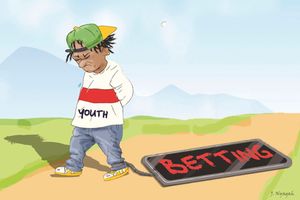
Members of Parliament have raised alarm over the possibility of betting and gaming companies defrauding the government of billions of shillings in taxes.
Members of Parliament have raised alarm over the possibility of betting and gaming companies defrauding the government of billions of shillings in taxes through manipulation of their systems, exposing the soft underbelly of the state-owned Betting Control and Licensing Board (BCLB).
This comes as Kenya Revenue Authority (KRA) Chief Manager for Betting and Gaming Mr Joseph Otieno told the Finance and National Planning Committee of the National Assembly betting companies could be involved in acts that deny government revenue.
Mr Otieno did not provide the details.
But Molo MP Kuria Kimani, the committee chairperson, upon analyzing a KRA document, noted that the betting companies could be involved in moderating the outcome of a bet to deny winners their prizes and, in the process, denying the government taxes from the wins.
“Based on the documents you have presented to this committee, I have observed an interesting scenario. While there is growth in excise duty on betting and gaming activities for the last two financial years, the withholding tax on wins continues to reduce. How is this possible?” Mr Kimani wondered.
The suspected foul play comes at a time the government is facing difficult times raising revenue to finance its operations that includes paying its workforce for service delivery while undertaking development projects.
“It has become an issue of national concern. It is important that we establish if the betting companies are carrying out their business as per the laws of the land. There has to be a balance between the profits made by the companies and the requirements of the law,” the Molo MP noted.
Mr Otieno told the committee that suspicions of betting system manipulation cannot be ruled out.
“I agree with you that there ought to be an increase in earnings from the betting and gaming activities,” said Mr Otieno adding; “if you place a bet that is our interest because we collect what is due.”
The excise duty, also known as sin tax, was introduced to deter people from among others, betting and gaming as a social vice with the tax burden borne by the players or punters who win.
The sin tax imposed on betting including horse racing, gaming, price competition and lotteries since December 27, 2024 is at the rate of 15 percent. Charitable lotteries are excluded.
The tax is charged on staked, wagered amounts, and amount paid or charged to enter a price competition and amounts paid to buy a lottery ticket.
The increase in Excise duty from the 12.5 percent that was in force from July 1, 2023 to December 26, 2024, followed amendments to the Excise Duty Act through the Tax Laws Amendment Act that became operational on December 27, 2024.
The sin tax changes sought to expand the country’s tax base by including the non-resident online or digital media advertisements at the rate of 15 percent with the intention to bring on board betting and gaming operators especially those from offshore destinations.
But the increase in sin tax did not deter betting activities.
Data from the KRA presented to parliament, shows that the government collected Sh19.6 billion in excise duty and income taxes from the betting and gaming activities for the current financial year- 2024/25- which is Sh2.53 billion increase compared to the 2023/24 fiscal period.
Despite the increase, members of the House committee believe that the taxes could have been more were it not for suspected manipulation of the system to deny government revenue.
An increase in excise duty means an increase in betting and gaming activities in the country and therefore a profit to the companies in business.
Withholding tax is imposed on the winnings recorded by players of punters and its policy objective is to ensure that there is a fair tax regime where all persons pay tax on all their incomes.
The KRA data before parliament shows that from July 2024 to March 2025, the government collected Sh9.976 billion in excise duty from the betting and gaming companies compared to the Sh8.03 billion realized between July 2023 and March 2024.
The document indicates that from July 2024 to March 2025, the government realized Sh4.8 billion in Withholding Tax from the successful players or punters.
The amount is however, a reduction from the Sh5.7 billion realized during the same period between 2023 and 2024.
The betting and gaming sector in the country is regulated by the BCLB, which is mandated by the Betting, Lotteries and Gaming Act to license, monitor, deregister or suspend any operators in case of need on a day-to-day basis.
“When you lose a bet, it means that the government loses out on Withholding tax. It therefore means that betting companies involved have every reason to manipulate the system and deny the government taxes to make more money,” said the Molo MP.
The fears of the suspected manipulation of the betting system, saw Kesses MP Julius Ruto, a member of the Finance and National Planning Committee wonder why the government should continue allowing betting and gaming activities “because it is losing out at the behest of the companies involved.”
“What would happen if we closed all the betting and gaming companies in the country? Is there a need to proceed with Sin tax on their activities if they are not transparent?” posed Mr Ruto.
However, Mr Otieno warned that if betting and gaming was to be banned, “the loss would be so significant to the country.”
The withholding tax on winnings is remitted into the Sports, Arts and Social Development Fund to promote sports while also leveraging on health financing among others, in the country.







